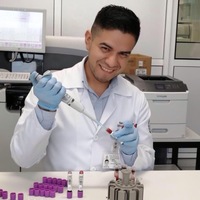
Sergio Ayala-Diaz
Summary
I completed my undergraduate studies and obtained my Master's degree at the Universidad del Mar, and I am currently pursuing my PhD in Nutrition Sciences and Dietetics at the Universidad Montrer. My academic training and research experience have focused on molecular cancer pathology, with a focus on the interaction between post-transcriptional regulation and epigenetic mechanisms modulated by nutrition and physical activity.
As part of my professional development, I have carried out clinical rotations in the Clinical Biochemistry, Hematology, Tumor Markers and Cytogenetics laboratories at the National Cancer Institute. These rotations have allowed me to gain experience in the analysis of oncological biomarkers and the molecular characterization of neoplasms. Currently, I am assigned to the Functional Genomics of Cancer Laboratory at the National Institute of Genomic Medicine (INMEGEN), where I participate in research projects oriented to the identification of genomic and epigenetic alterations in cancer, with special emphasis on post-transcriptional regulation mediated by microRNAs (miRNAs) and tumor metabolic reprogramming.
In the academic field, I serve as a Professor at the National Institute of Sports Sciences, Physiotherapy and Health, teaching at the master's level. I am also a member of the Scientific Advisory Committee of this institution, where I collaborate in the evaluation and development of academic programs in health sciences. Concurrently, I serve as an undergraduate and graduate professor at the Faculty of Dentistry of the Universidad Intercontinental, where I play a pivotal role in shaping the future dental professionals of biomedicine and oral health.
My research interests include the molecular pathology of cancer, microRNA-mediated post-transcriptional regulation, and metabolic reprogramming in neoplasms. I am particularly interested in the impact of non-pharmacological strategies based on nutrition, dietetics, and physical activity as epigenetic modulators in tumor progression and therapeutic response.